Jasmine, with its exquisite beauty and enchanting fragrance, has captivated hearts and minds for centuries. Originating from the tropical and subtropical regions of Asia, this delicate flowering plant has a fascinating history intertwined with diverse cultures and traditions. From its humble beginnings, the symbolic significance of jasmine flowers has evolved and transformed over time, weaving tales of love, spirituality, and hope. But what do jasmine flowers symbolize?
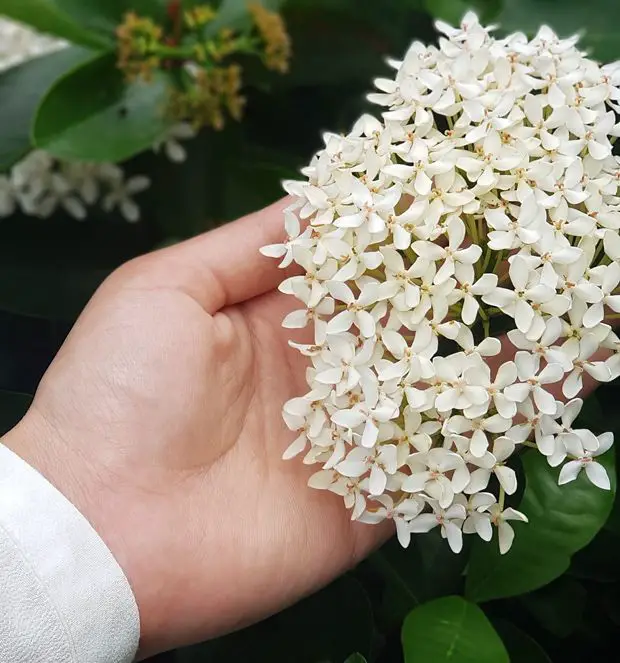
Jasmine flowers symbolize beauty, love, purity, and grace. They are associated with sensuality, romance, and spiritual purity in many cultures. The delicate fragrance of jasmine is often considered a symbol of hope, happiness, and new beginnings.
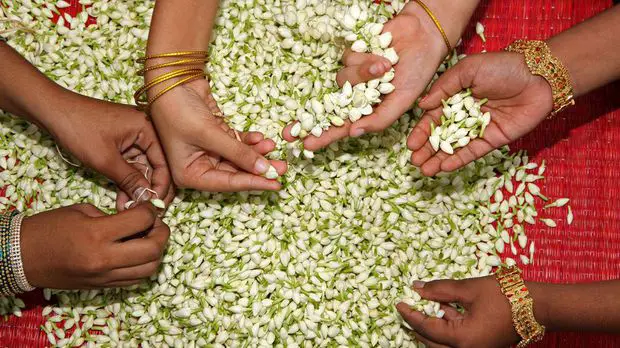
In this article, we delve into the cultural significance of jasmine and explore the meanings associated with these mesmerizing blossoms.
Jasmine plants, scientifically known as Jasminum, belong to the Oleaceae family and encompass hundreds of species. The origins of jasmine can be traced back to ancient Persia (present-day Iran) and India, where it was cherished for its ethereal allure. It was in these regions that the captivating fragrance and delicate beauty of jasmine blossoms were first discovered and celebrated.
Throughout history, Jasmine's symbolism has adapted to the changing beliefs and customs of different societies. Initially, it was cherished for its aesthetic qualities and admired for its enchanting fragrance and the elegance it brought to gardens and ceremonial spaces.
As its cultivation spread to new lands, jasmine began to acquire deeper meanings and associations, transcending mere physical beauty. The allure of jasmine lies not only in its visual appeal but also in the mesmerizing scent it releases, especially during the twilight hours.
The aroma of jasmine is often described as intoxicating, evoking a sense of tranquillity and sensuality. This captivating fragrance has made jasmine an essential ingredient in perfumes, candles, and aromatic oils, further enhancing its reputation as a symbol of beauty and luxury.
Jasmine flower symbolism. What is the spiritual meaning of Jasmine?
Jasmine flowers possess profound spiritual symbolism across cultures, representing a connection to the divine and serving as a source of spiritual inspiration. Let's explore in detail some of the spiritual meanings associated with jasmine:
Purity and Divinity
Jasmine is widely regarded as a symbol of purity and divinity. The pristine white blossoms of certain jasmine species, such as Jasminum sambac, are seen as representations of spiritual perfection and the sacred. In religious ceremonies and rituals, jasmine flowers are used as offerings to honour deities and invoke a sense of purity and transcendence.
In Hinduism, jasmine holds significant spiritual symbolism. During religious ceremonies, jasmine flowers are commonly offered to deities such as Lord Vishnu and Lord Krishna. One specific ceremony where jasmine flowers play a significant role in the "Pushpa Alankara" or floral decoration ritual.
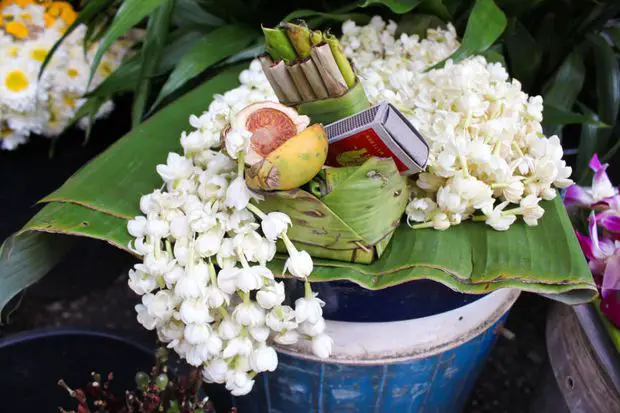
In Hindu temples, especially in South India, deities are adorned with elaborate floral decorations as a form of worship. The Pushpa Alankara ceremony involves the decoration of the deity with various flowers, including jasmine garlands. The garlands are carefully crafted, often woven with precision and skill, and then draped on the deities' idols or images.
During this ritual, devotees believe that offering jasmine garlands to the deities symbolizes purity, divinity, and reverence. The fragrance of the jasmine flowers is considered auspicious and is believed to attract the blessings of the divine. The practice is accompanied by chants, prayers, and devotional music, creating a spiritually uplifting atmosphere.
One renowned temple where the Pushpa Alankara ceremony takes place is the famous Meenakshi Temple in Madurai, Tamil Nadu, India. The temple is dedicated to the goddess Meenakshi, a form of the divine feminine.
During festive occasions and special celebrations, the deities in the temple, including Meenakshi and her consort Lord Sundareswarar, are adorned with magnificent jasmine garlands as part of the Pushpa Alankara ritual. The fragrance of jasmine fills the temple precincts, creating a sacred and enchanting ambience.
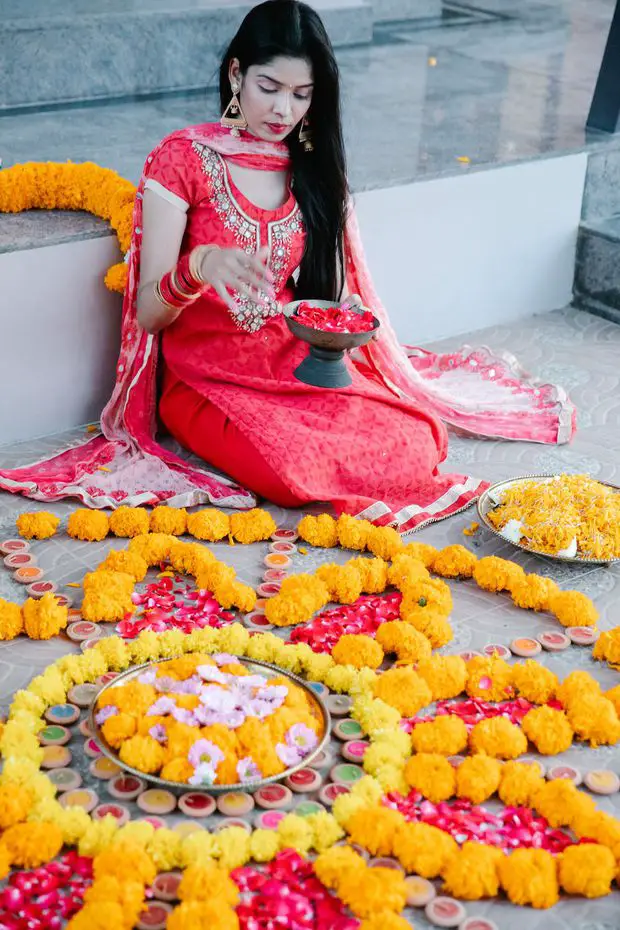
The Pushpa Alankara ceremony showcases the deep-rooted belief in the purity and divinity associated with jasmine flowers in Hindu rituals. It demonstrates the devotees' devotion and their desire to offer the best of nature's creations to honour and connect with the divine.
Spiritual Awakening
The intoxicating fragrance of jasmine is believed to have a profound impact on spiritual experiences. It is thought to enhance meditation, promote clarity of mind, and facilitate spiritual awakening. The sweet scent of jasmine flowers is often used to create a serene and uplifting atmosphere during spiritual practices, aiding in the exploration of inner realms and higher consciousness.
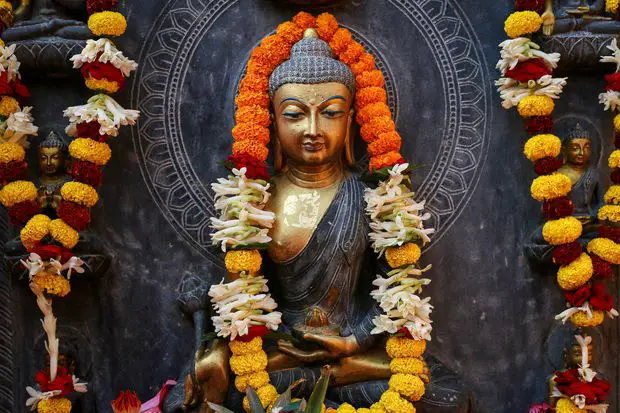
While spiritual awakening can happen in various contexts and traditions worldwide, one example that stands out is the association of jasmine with meditation practices in Buddhist traditions.
Buddhism has a rich history of utilising jasmine flowers to enhance meditation and facilitate spiritual experiences. In Buddhist monasteries and meditation centres, jasmine is often incorporated into the environment to create a conducive atmosphere for deep contemplation and mindfulness.
In Thailand for example, Jasmine plays a significant role in meditation practices. Buddhist temples and meditation centres commonly use jasmine incense or essential oils to scent meditation halls. The delicate fragrance of jasmine helps to create a serene and uplifting environment, calming the mind and enabling practitioners to enter a focused and tranquil state during meditation.
Buddhist temples around the world, from Southeast Asia to Japan, often feature jasmine gardens or incorporate jasmine flowers as part of their meditative spaces. These gardens provide a peaceful setting where practitioners can immerse themselves in the beauty and fragrance of jasmine while engaging in meditation or contemplative practices. The presence of Jasmine is believed to enhance the overall atmosphere and help create a harmonious environment for spiritual growth.
The specific rituals and practices may vary across Buddhist traditions and regions, but the use of jasmine as a tool for spiritual awakening and meditation is a common thread. Jasmine's soothing fragrance and calming properties are believed to promote mental clarity, mindfulness, and a deeper connection with one's inner self.
It has been the case of meeting several individuals practising meditation throughout my years of travels around Asia and have been told about the profound effects of jasmine on their spiritual journeys.
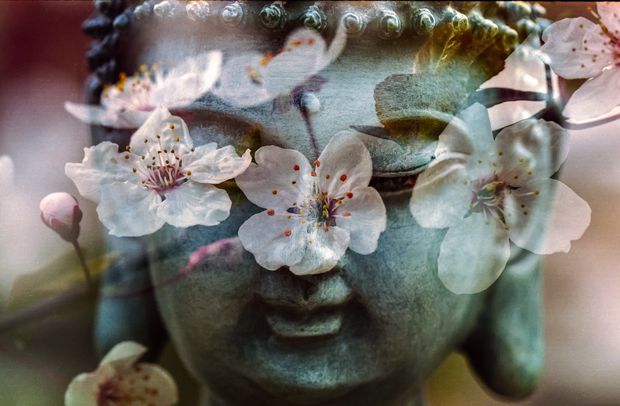
Some have shared personal testimonies of how the scent of jasmine, either through incense or essential oils, has aided them in achieving a deeper level of concentration, tranquility, and heightened awareness during meditation sessions. They describe the fragrance as evoking a sense of calmness, clarity, and inner peace, facilitating a more profound connection with their inner selves.
Illumination and Enlightenment
Jasmine flowers are associated with illumination and enlightenment. The delicate beauty and alluring fragrance of jasmine blossoms are believed to inspire inner growth, self-realization, and the pursuit of spiritual knowledge. Jasmine is often considered a guiding light on the path to enlightenment, symbolizing the awakening of one's true nature and the pursuit of higher truths.
There are specific practices and rituals that reflect the belief that Jasmine's beauty and fragrance inspire inner growth, self-realization, and the pursuit of higher truths.
A very good example of this is in the state of West Bengal, India, the festival of Yasmin Purnima celebrates the blooming of jasmine flowers, also known as "yasmin" in Bengali. The festival usually takes place in the month of May, when jasmine flowers are in full bloom.
It is believed that during this time, the fragrance and beauty of jasmine inspire spiritual awakening and enlightenment. Devotees offer prayers and pay homage to the jasmine flower as a symbol of inner illumination and the pursuit of higher knowledge.
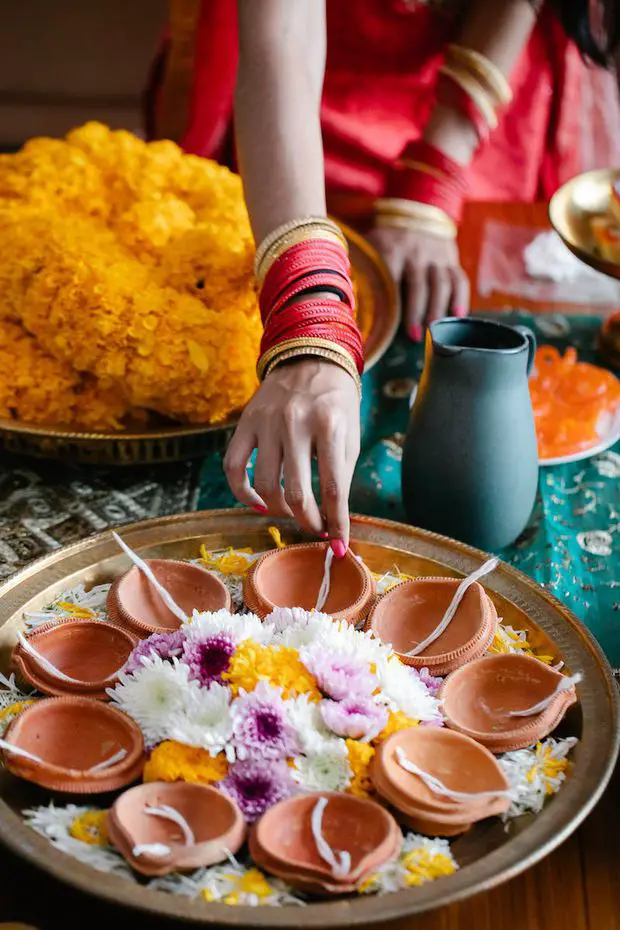
Another beautiful ritual is The Pushkar Fair, held annually in the town of Pushkar, Rajasthan, India, is a vibrant event that combines a livestock fair with religious and spiritual activities. During the fair, participants engage in spiritual rituals and offer prayers at the sacred Pushkar Lake. Jasmine flowers are commonly used as adornments during these rituals, symbolizing the illumination of the spirit and the pursuit of enlightenment.
In Bali, Indonesia, for example, offerings play a vital role in daily rituals and ceremonies. Jasmine flowers, known as "meli putih" in Balinese, are often used in these offerings. Balinese Hindus believe that the fragrance of jasmine is pleasing to the gods and can guide them towards spiritual illumination.
During temple ceremonies, Balinese devotees create intricate offerings known as "canang sari," which often include jasmine flowers, and present them as a gesture of gratitude and devotion to the divine.
Very different from previous cultures, yet having Jasmine flowers as a common trait, Sufi mysticism is a spiritual path within Islam that focuses on experiencing a direct connection with the Divine. Through practices like meditation, chanting, and poetry, Sufis seek to purify the heart, cultivate love, and attain spiritual union with God. It emphasizes the inner, experiential aspects of Islam and has influenced Islamic spirituality and culture throughout history.
Within the Sufi mystical tradition, Jasmine holds great significance. It is seen as a symbol of spiritual love and longing for the divine. In certain Sufi rituals, jasmine petals are scattered during devotional gatherings as a representation of the soul's journey toward illumination and the intense yearning for union with the beloved.
Symbol of the Soul
In certain spiritual traditions, jasmine is seen as a symbol of the soul. The ephemeral nature of jasmine, with its flowers blooming at night and fading away by morning, represents the transient nature of life and the soul's journey beyond the physical realm. Jasmine serves as a reminder of the eternal nature of the soul and the interconnectedness of all living beings.

For the Balinese people, jasmine has a profound meaning and they integrate the symbolism of the soul into their daily religious and spiritual practices.
During Ngaben, the traditional cremation ceremony, jasmine garlands are placed on the deceased to symbolize the purification and liberation of the soul. The fragrance of jasmine is believed to guide the departed on their spiritual journey.
Jasmine's association with the soul is deeply woven into their cultural fabric, expressed through offerings, temple ceremonies, and personal rituals that honour the spiritual essence within each individual.
In Bali, the concept of the soul is seen as an essential part of an individual's spiritual journey. Balinese Hindus make daily offerings called "canang sari" to honour deities and spirits. These offerings often include jasmine flowers, among other items. The jasmine flowers are seen as a representation of the soul and are used to attract positive energies and blessings. Balinese people believe that by offering jasmine, they are purifying and honouring the soul within themselves and connecting with the divine.
Balinese temple ceremonies, known as "odalan," are vibrant events that bring the community together in celebration. During these ceremonies, jasmine flowers are used in various forms, such as garlands, to adorn the temples and the sacred objects within them. The presence of jasmine in these rituals signifies the soul's connection with the divine and the aspiration for spiritual growth.
Lastly, it is not uncommon to see individuals in Bali often incorporating jasmine into their personal spiritual practices. For example, during meditation or prayer, some people may place jasmine flowers or essential oils near their sacred spaces to create a serene atmosphere that aids in connecting with the soul and the divine essence within.
Peace and Tranquility
The serene presence of jasmine flowers is often associated with peace and tranquillity. The sight and fragrance of jasmine can evoke a sense of calmness, helping to create a harmonious and soothing environment. It is not uncommon to find jasmine planted near temples, meditation spaces, and sacred gardens, where its presence enhances the atmosphere and facilitates a peaceful state of mind.
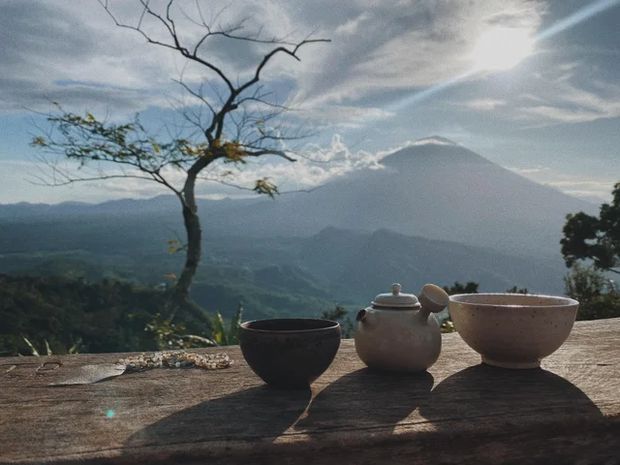
This meaning is deeply rooted is Thailand, particularly during the annual Loy Krathong festival. The Loy Krathong festival is widely celebrated in Thailand, usually during the full moon night of the twelfth lunar month (typically in November). The festival is dedicated to expressing gratitude to the water goddess, paying respects to ancestors, and letting go of negativity to find inner peace. Jasmine flowers play a significant role in this festival, symbolizing peace, purification, and serenity.
During the Loy Krathong festival, people release "krathongs" into rivers, lakes, and other bodies of water. A krathong is a small, beautifully decorated float traditionally made of banana leaves, flowers, and candles. Jasmine flowers are commonly incorporated into these krathongs, along with other natural materials.
As people release their krathongs into the water, it is believed that they are symbolically releasing their negative thoughts, emotions, and burdens. The act of floating the krathong and watching it drift away represents letting go of troubles and finding peace within oneself. The fragrance of jasmine flowers enhances the sensory experience, creating an atmosphere of tranquillity and serenity during the festival.
Beyond the Loy Krathong festival, Jasmine's association with peace and tranquillity can be found in various cultures and traditions around the world. The delicate scent of jasmine is believed to have a calming effect on the mind, promoting relaxation and inner harmony. It is often used in aromatherapy and relaxation practices to create a peaceful ambience and induce a sense of tranquillity.
Healing and Purification
The essential oil derived from jasmine flowers is believed to possess healing properties, both physically and emotionally. It is used in aromatherapy to promote relaxation, reduce stress, and uplift the spirit. Jasmine's soothing fragrance is thought to purify the mind, body, and soul, aiding in emotional healing and restoring balance.
Healing
Jasmine Tea in Traditional Chinese Medicine: In traditional Chinese medicine, jasmine tea is highly regarded for its healing properties. Jasmine flowers are infused with green tea leaves, allowing their fragrance and essence to meld with the tea. Jasmine tea is believed to have calming effects on the mind, aid digestion, promote relaxation, and alleviate stress. It is often consumed to restore balance and harmony within the body.
Jasmine Baths and Aromatherapy: Jasmine flowers are used in aromatherapy and bathing rituals for their healing qualities. In various cultures, jasmine petals or essential oils are added to baths to enhance relaxation, uplift the spirit, and promote a sense of well-being. The soothing aroma of jasmine is believed to have a therapeutic effect on both the mind and body, relieving tension and promoting a state of calmness.
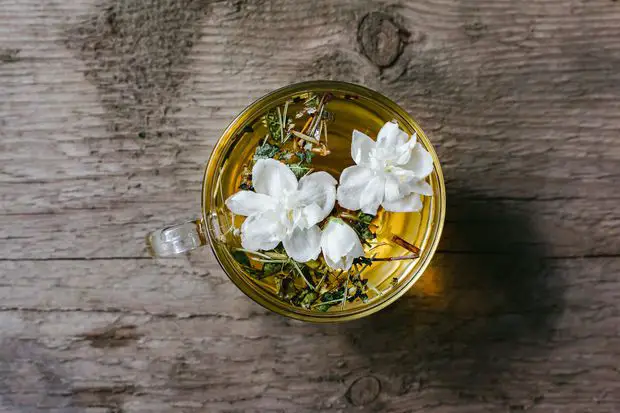
Jasmine-infused Oils and Massage: Jasmine essential oil is known for its therapeutic properties, including its ability to calm the mind, uplift the mood, and promote relaxation. In massage therapy, jasmine-infused oils are often used to enhance the healing experience, providing stress relief, and easing muscle tension. The fragrance of jasmine helps create a soothing and serene environment during the massage.

Purification
Floral Smudging and Cleansing: In some traditions, dried jasmine flowers are used in smudging and energy-cleansing rituals. The smoke from burning dried jasmine is believed to purify the environment, remove negative energies, and promote healing and renewal. These rituals are often performed to clear stagnant energy, create a harmonious atmosphere, and restore spiritual balance.

Wedding Ceremonies and Jasmine Garlands: In certain cultures, jasmine garlands hold significance in wedding ceremonies. For example, in Indian weddings, the bride and groom may exchange jasmine garlands as a symbol of purity and the purification of their union. The fragrance of jasmine is believed to bless the couple with happiness, love, and a harmonious journey together.
Romance and Love
In Tamil Nadu, a state in Southern India, the Madurai Meenakshi Temple is renowned for its elaborate rituals and celebrations. One such celebration is the annual Chithirai Festival, a significant event that commemorates the divine marriage of Goddess Meenakshi and Lord Sundareswarar.

During the Chithirai Festival, the temple comes alive with vibrant decorations and ceremonial rituals. A prominent feature of the festival is the adornment of the deities with intricate jasmine garlands, known as "malligai maalai" in Tamil. These garlands are meticulously handcrafted, consisting of fresh jasmine flowers strung together.
The presence of jasmine garlands during the Chithirai Festival holds deep symbolic significance. The fragrance of jasmine permeates the temple, symbolizing romance and love. It represents the divine union of Goddess Meenakshi and Lord Sundareswarar, a manifestation of the eternal bond between feminine and masculine energies.
The exchange of jasmine garlands between the deities during the festival is a sacred act, signifying the union of the divine couple and the blessings of love and harmony. Devotees believe that witnessing this ceremony and inhaling the fragrance of jasmine brings forth auspicious energies, invoking blessings for their own relationships and love lives.
Beyond the Chithirai Festival, jasmine's association with romance and love can be found in various cultures. The delicate and intoxicating scent of jasmine is often linked to feelings of passion, sensuality, and emotional connection. It is not uncommon to find jasmine flowers being used in weddings, romantic celebrations, and rituals that invoke love and affection.
Final thoughts
There you go! As we have explored the multifaceted meanings of jasmine flowers, we have delved into the spiritual awakenings they inspire, the illumination and enlightenment they symbolize, and the purification and healing they offer. We have seen how Jasmine has become intertwined with the soul, serving as a reminder of our inner essence and our connection to the divine.
From their spiritual connotations to their association with love, peace, and healing, jasmine flowers have long captured the human imagination and stirred our hearts.
Across continents and cultures, jasmine flowers have been revered and incorporated into rituals, ceremonies, and daily practices, reflecting the universal longing for spiritual growth, love, and inner peace.
So, the next time you encounter jasmine, pause for a moment, breathe in its delicate aroma, and let its symbolic essence guide you on a journey of self-discovery, connection, and serenity.
